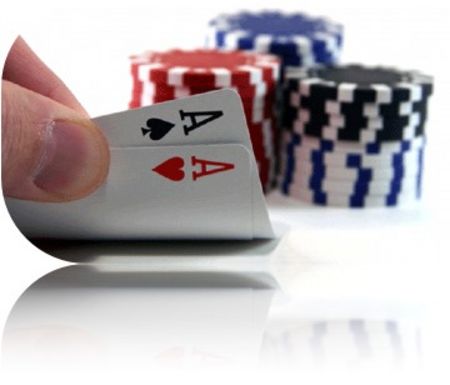Betting or Raising to Gain Bets

A common mistake made by many players is betting or raising the river whenever
they think they have the best hand. Do not make this same mistake!
Advanced Concept: Only bet or raise a good hand on the river against a lone opponent when you
have at least a 50% chance of winning when your opponent calls.
The key part of this advanced concept is when your opponent calls. Many times you
will bet the river and your opponent folds. That bet hasn't gained you anything.
Let's look quickly at an example. You hold Q ♥ Q ♠ with
a K ♣ 5 ♣ 2 ♥ 4 ♠ 8 ♦ board. You
bet out on the flop and are called. You bet out on the turn and are called. You
determine that the most likely holding for this opponent is a flush draw. Should you
bet the river? The answer is no, since your opponent will fold if he was on a flush
draw. Betting will gain you nothing. A better option would be to induce a bluff by
checking.
Many opponents with a busted draw may see your check as a sign of weakness
and won't be able to resist betting as a last chance bluff to win the pot. In this case,
checking gains you a bet while betting out probably gains you nothing.
On the other hand, if you are against an aggressive player who tends to call too
often with weak pairs, then it is probably correct to bet. It is unlikely your opponent
holds a pair of kings since an aggressive opponent probably would have raised
either the flop or turn. He most likely would have raised a flush draw also at some
point. In this situation, betting could be correct since you will win over 50% of the
time when your opponent calls with a weak pair. The reasoning however is
different. You check if you believe your opponent was on a draw, and you bet if you
are reasonably confident, that your opponent will call with a hand weaker than a
pair of kings.
You need more than a 50% chance of winning when there is the risk that your
opponent could raise with a better hand and you would call. In this case, you might
lose two big bets against a very good hand and only win one bet against a weak
hand, so you need more than a 50% chance of winning to justify this risk. For
example, if you have roughly a 50% chance of winning a showdown but there is a
5% chance your opponent would raise and a 70% chance he would win when
raising, you should just check and call rather than betting out.
For example, you hold KQ with a K548T board. You believe there is a 10% chance
your opponent holds KQ, a 30% chance of KJ, a 20% chance of KT, and a 40%
chance he would fold his other hands if you bet. You rarely would have a read this
specific, but it is shown for example. Should you check or bet?
Let's play this hand 10 times and look at the scenarios. If you bet first, four times
you will win when he folds but gain nothing, once you will split and gain nothing,
three times you will win a big bet, and twice you will lose two big bets when your
opponent raises two pair. Your net result is minus one big bet for an overall
negative expectation. Remember, the money in the pot is already yours if you have
the best hand, so you don't include this in your analysis.
Now let's look at the results when you check, assuming that your opponent will bet
any pair of kings and check anything else. Four times you gain nothing when he
checks, you split once, and you win a bet three times against KJ. and you lose a bet
two times against KT. The overall result is plus one bet for a positive expectation. It
is actually more profitable to check this hand. It would be even more profitable if
you induce some bluffs by getting your opponent to bet an inferior hand that he
would have folded if you had bet.
You had a 50% chance of winning a bet in a showdown, but because of the risk that
your opponent might raise, you were better off just checking and calling in this
example. Things get more complicated if you take away the assumption that your
opponent would bet any pair of kings. Some opponents may not bet a hand that
they would call with. In the example, some opponents might not bet KJ if you check.
In this case, you are better off betting out even though you have a negative
expectation on. the bet. Do you see why? You actually lose more by checking and
calling if your opponent will only bet two pair.
To summarize, there are several considerations you must make when betting into a
lone opponent on the river with a good hand:
-
Probability that you will win in a showdown (should be at least 50%)
- Probability that your opponent would raise and you would call
- Probability that your opponent would bet a weaker hand if you check but fold
this hand if you come out betting
- Probability that your opponent would check a losing hand that he would call
with if you bet
Expanding on the second point, sometimes your opponent will raise and you will
fold. This doesn't necessarily make your river bet incorrect. For example, you hold
AA against a known opponent and a board of AKQ5T. Betting in this situation would
be correct if you know that your opponent would only raise with the jack but would
call with two pair and you are unsure if he would bet two pair if you check. If you bet
and he raises, you can safely fold, losing the same amount as checking and calling.
If you bet and he calls with two pair, yon gain a bet. Your expectation is the same
when he has the jack, but you gain a bet when he doesn't.
Advanced Concept: Sometimes it is correct to bet into a scary board on the river
with a strong hand if you can safely fold when you are raised.
This rule does not apply against tricky opponents, if you are against an opponent
who will bluff raise or do other things to try to win the pot, the decision process is a
little more complicated. In this case, you need to compare the various probabilities
of all of the possible scenarios:
-
The probability of him calling and you winning the bet
- The probability that he will raise and you will lose two bets
- The probability that he will raise and you will win two bets
- The probability that if you check he would bet a hand he would not have
originally called with
I realize that this can get quite complicated, so you just have to use your best
judgment in the heat of the action.
Another option when acting first on the river is to check-raise. There are two
reasons to try a check-raise with a strong hand on the river:
-
To induce a bluff.
- To gain more bets when you are confident that an opponent will bet and call
your raise.
For example, you hold Q
♦ J
♦
with a board of K
♦ T ♣
5
♥ 7
♦ 2
♦. Your opponent raised
your flop bet and bet the turn, so you are fairly certain he will bet the river. This
would be a good time for a check-raise to try and gain two bets.
This scenario would be different however if the board was K ♦ T ♣
7 ♦ 5 ♥ 2 ♦. Do you
see why? In this case, the bettor may be worried that you were on a flush draw
since the flop was two-suited. A check-raise in this case might backfire if your
opponent decides to check. You lose a bet if he would have called. Check-raises
also gain you nothing if your opponent doesn't call your raise but would have called
your bet.
Let's look at another situation quite similar. Most opponents are reluctant to bet
when a scare card falls on the river that makes the board four-suited or four-
connected, or pairs a key card, especially top pair; therefore, it is usually best to go
ahead and bet into your opponent with a strong hand to try and gain at least one
bet. Most opponents will call a bet to ensure you are not bluffing but are reluctant to
bet and risk a check-raise.
Advanced Concept: Check-raising is risky when the board would scare your opponents from betting;
therefore, usually bet out to gain at least one bet.
For example, check-raising is risky when holding A ♦ T ♥
and a board of K ♦ T ♣ 7 ♦
5 ♦ 2 ♦.
You should probably not try a check-raise in this scenario except against an
extremely aggressive and maniac opponent. Most opponents would never bet this
board on the river unless they have the A ♦ or Q ♦ ; however, most opponents would
call a bet to make sure you aren't bluffing.
One more situation that occurs on the river is when you are against several
opponents and are faced with a bet and you have a very strong hand. Sometimes
consider just calling rather than raising your strong hands to get the remaining
opponents to call. This is especially true if there is even a small chance that the
bettor has the nuts and will reraise or there is a good chance you might split the pot
with the bettor.
For example, if you hold Q ♣ T
♦ with a J
♥ T ♠ 9
♦ 8 ♣ 5
♦ board, you should just call if
there are opponents behind you. You probably are going to split the pot with the
bettor, so it is best to give your remaining opponents a chance to call. In addition,
there is the possibility that your opponent holds KQ and would reraise costing you
money.
NEXT..
Betting or Raising as a Bluff

